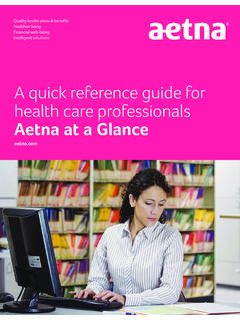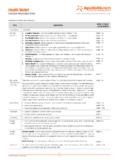Transcription of The New Mandatory Health Insurance Scheme - EY
1 February 2015 Insurance NewsletterKey edition highlights Access to basic Health Insurance and increased Insurance penetration will likely attract more investment into healthcare and Insurance . New Insurance products may be introduced to reduce potential pressure on premiums (existing and new) or loss of business. As a differentiator from increased competition, insurers may consider developing efficient claim management New Mandatory Health Insurance SchemeTaking stock one year after the introductionIntroductionEffective 1 January 2014, the new Mandatory Health Insurance Scheme (JKN) managed by Badan Penyelenggara Jaminan Sosial (BPJS), Indonesia s Social Security Organising Body, was introduced. A year later, we take a closer look at the opportunities and challenges that insurers, hospitals and employers are 130 million Indonesians are already registered (status: November 2014) and by the end of 2018 all Indonesian citizens and residents (including expatriates) have to be registered at JKN.
2 Based on research and interviews with industry experts, this newsletter highlights the key issues and intends to bring light to key questions including:We hope this newsletter will interest you in the Mandatory Health Insurance Scheme , and we look forward to having further dialogue with you. By when do employees have to be registered at BPJS? What is the coverage of BPJS and what are its limitations? How much are the contributions to BPJS and what is the cost if employees already enjoy private Health Insurance benefits? What are the claim procedures? What are the benefits for employers to outsource claim management? How can an insurer coordinate benefits with BPJS? What are the opportunities, challenges and threats of the introduction of BPJS?
3 Why is a communication strategy important? JKN Facts 130 million Indonesians are registered at BPJS By 2018, all Indonesian citizens and residents are required to participate No opt out for employers who provide premium Health Insurance benefits to their employees Insurance companies can sign an individualized Coordination of Benefits (CoB) agreement with BPJST homas WirtzPartnerTransaction Advisory ServicesTel : +62 21 5289 5031 Email : when do employees have to be registered at BPJS?The Indonesian government envisages that this healthcare Scheme will cover all citizens universally by 1 January 2019. The diagram below summarises the timeline of deadline for small, medium and large state-owned and private enterprises to register its employeesRegistration deadline for all Indonesian citizens and residentsRegistration deadline for micro enterprises to register its employees2013201520172019201420162018 Launching of BPJS: Companies, which employees registered to Askes and Jamsostek, start to register its employees and pay premiums Members of the Indonesian army, police, civil employees,and assistance recipients (PBI) are due to be registeredWhat is the coverage of BPJS and what are the limitations?
4 JKN covers medical and non-medical benefits but excludes esthetics, orthodontics, infertility treatments, drug rehabilitation programmes and claims related to extreme hobbies, services performed overseas, etc. This Scheme is Mandatory for all Indonesian citizens and residents*, including those who are covered by other Health Insurance to private Health Insurance in Indonesia, BPJS does not impose caps on medical and non-medical benefits to basic Health Insurance for all Indonesians, accompanied by increased Insurance penetration, will likely attract more investments into healthcare facilities and of medical benefitsExamples of non-medical benefits Medical examination, treatment, and medical consultation Vaccine for basic immunization and basic contraception Medicine and medical consumables Non-intensive and intensive care hospitalizations Medical implant services Accommodation benefits Ambulance services Medical forensic services Morgue services at healthcare facilities Administrative services Source: Presidential Regulation 12/2013 How much are the contributions to BPJS and what is the cost if employees already enjoy private Health Insurance benefits?
5 The table below summarises the contributions and healthcare accommodation levels by member employees already enjoy private Health Insurance benefits, contributions to BPJS represent additional costs for the employer and the premiumHealthcare accommodation levelPBIRp19,225/person paid by classCivil servant / military / police / of salary (max. Rp94,500) paid by employee, of salary (max. Rp141,750) paid by & second classPrivate business employees and non-civil servant government of salary (max. Rp23,625) paid by employee and of salary (max. Rp189,000) paid by employers up to June 2015. of salary (max. Rp47,250) paid by employee and of salary (max. Rp189,000) paid by employer from July 2015 & second classInformal worker and non-employee1.
6 Rp25,500 per person2. Rp42,500 per person3. Rp59,500 per person1. Third class2. Second class3. First classPBIA dditional burdens from BPJS contributions on companies employing unskilled labour could lead to pressure on premiums (existing and new) or a loss of business for insurers. To address this risk, new private Health Insurance products should be are the claim procedures?How can an insurer coordinate benefits with BPJS?What are the benefits for employers to outsource claim management?JKN operates on cashless referral model - refer to the diagram below for an illustration of claim insurer and BPJS can sign a CoB agreement which regulates how the insurer and BPJS will split the payment for claims. At present, CoBs are individually negotiated between the insurer and BPJS; however standardising CoB agreements with insurers are currently under discussion.
7 Many market observers perceive this discussion to be one of the reasons why BPJS has recently ceased signing new (December 2014), there are 30 private Insurance companies that have signed a CoB agreement. There are only 16 hospitals (11 in Jakarta and 5 outside of Jakarta) operating the CoB Scheme . Alternatively, if no CoB agreement is signed, the insurer can offer new products that complement the JKN must choose a first level public healthcare facility from BPJS, usually a public Health centre. The first treatment must be done here unless it is an emergency. Secondary care is by referral from the first level public healthcare facility, mostly to a public has sparked complaints from participants due to its rigid referral system which decreases flexibility in choosing healthcare facilities and reduces the productivity of employees.
8 Apart from flexibility and productivity concerns, costs ( travel costs for employees who work in remote areas but are registered at only one first level public healthcare facility) and Health risks (due to delayed treatment driven by an inefficient process) can be registers for JKN to BPJSV isitClaimClaimBPJS will assign participant to one first level healthcare facilityThe assigned public healthcare facility will refer participant to referral Health facility when advanced care neededAssigned first level public healthcare facilityReferral healthcare facilityParticipant 134625 Employers might consider outsourcing claim management to reduce administrative costs and potential cash flow implications from poor claim management, which is not their core business.
9 The increased complexity of claim management creates opportunities for Insurance companies to help employers by introducing new integrated Insurance scale and complexity of BPJS provides opportunities for insurers to develop good claim management systems to maximize efficiency and reduce costs, and as a differentiator to increased the CoB Scheme is not widely accepted by hospitals, opportunities exist for insurers to offer new products that complement the JKN From a Healthcare ProviderInsights from an Insurance ProviderEstablished in 2009, Kemang Medical Care (KMC) is a small specialist for women and children s healthcare centre located in South Jakarta. KMC has 50 in-patient beds, operating theatres and various specialists out patients clinics based onsite.
10 Registration with BPJS would require that a hospital in type A, B, C or D allocate 20% of its total beds to middle- and low-income patients. Board of Director KMC say KMC has not registered for the BPJS Scheme . KMC is not required to register with BPJS because it currently does not have the full hospital status. That is not to say that BOD is not yet interest in a participating in BPJS. KMC has simply not been designed to cater for BPJS patients as this would require more, yet unavailable, space to separate facilities for private and BPJS patients, BOD says. KMC aims to build and or develop new satellite hospitals for BPJS patients in other locations in rural area, and has Please describe your experiences (good and bad) with BPJS and the CoB program?














